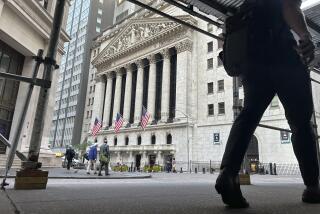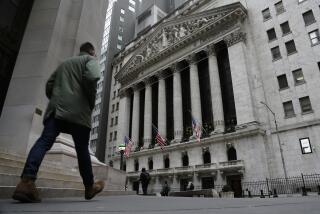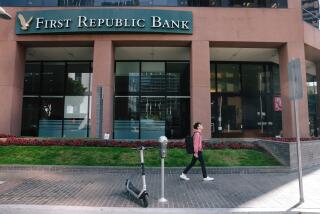Brazil Bailout Buoys U.S. Bank Stocks
- Share via
The stocks of big U.S. banks moved sharply higher Thursday, a day after Brazil obtained an emergency loan package from the International Monetary Fund that eased concerns about defaults on loans and bonds in Latin America.
An index of 24 major bank stocks surged 5.4%. Citigroup Inc. shares climbed $2.38 to $33.90, and J.P. Morgan Chase & Co. was up $2.34 at $26.38. FleetBoston Financial Corp., which has more than $7 billion of exposure in Brazil and has lost billions of dollars in Argentina, gained $1.71 to $23.62. Bank of America Corp. rose $3.14 to $68.39, and Wachovia Corp. was up $1.36 at $36.01; both are major lenders to Brazil.
The emergency aid for Brazil, the largest bailout in the IMF’s history, was accompanied by the announcement of $1.5 billion in bailout funding for Uruguay and a pledge by U.S. Treasury Secretary Paul H. O’Neill to help Argentina. That signaled to investors that the Bush administration, in a change of policy, will come to the aid of troubled Latin American economies, said David Hendler, financial services analyst at CreditSight Inc. in New York.
Hendler said investors fear the troubles that have devastated Argentina could spread beyond Uruguay and Brazil to the rest of South America and then to emerging-market economies in the Far East and perhaps to additional countries.
“The worry underneath it all is that Mexico might be susceptible--and that’s right on our doorstep,” Hendler said. “Why was the Treasury secretary so intent on taking a stand? He’s worried about the effect” of problems in Mexico on the United States.
He said 35% of Citigroup’s assets are in emerging markets, including Mexico. Other U.S. banks also have significant exposure to those economies.
Some analysts expressed surprise that bank stocks responded so robustly to the IMF bailout, given the severity of Latin America’s debt problems.
“I don’t think you can wave a wand over this and make it go away,” Lehman Bros. analyst Brock Vandervliet said.
Despite record bank earnings, the stocks of big banks have slumped this summer, in part because of fears lenders would be implicated in the accounting scandals that have battered corporate America.
Analysts said investors were reassured by an announcement Wednesday by Citigroup, the nation’s largest financial services company, that it would require clients to disclose the implications of off-balance-sheet partnerships. J.P. Morgan, Citigroup’s chief rival, said it also would require more such disclosure from clients.
The two banks were criticized by Congress for involvement in partnerships allegedly designed to help Enron Corp. conceal the huge debts that toppled the energy trader into bankruptcy.
Bank stocks also were buoyed Thursday by word that the Labor Department’s wholesale inflation index fell 0.2% in July. Economists had expected a slight gain, and analysts said the decline confirms that the near-term risk of inflation is almost nil, allowing the Federal Reserve to keep interest rates at 40-year lows or even push them down further.
The stocks got an extra boost when short sellers--speculators who sell borrowed stock in hopes of buying it back cheaply--bought bank shares when the stock prices moved higher, Vandervliet said.
*
(BEGIN TEXT OF INFOBOX)
Brazilian Bounce
News of a $30-billion loan to help Brazil stave off a default on its debt gave a boost to bank stocks Thursday. These five banks have the largest exposure to Brazil among U.S. lenders:
Brazilian Loans Assets* Thursday YTD Bank (billions) (billions) close change %chg.
Citigroup $9.3 $1,051.5 $33.90 +$2.38 -32.8%
FleetBoston 7.1 203.6 23.62 +1.71 -35.3
J.P. Morgan 2.7 693.6 26.38 +2.34 -27.4
Bank of America 2.0 621.8 68.39 +3.14 +8.6
Wachovia 1.1 330.5 36.01 +1.36 +14.8
* At fiscal year end 2001
Sources: Lehman Bros., Wachovia, Bloomberg News
More to Read
Inside the business of entertainment
The Wide Shot brings you news, analysis and insights on everything from streaming wars to production — and what it all means for the future.
You may occasionally receive promotional content from the Los Angeles Times.











